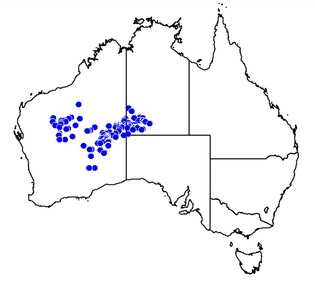Acacia abrupta
Contents
General Plant Info
Acacia abrupta is a spreading, resinous shrub, 0.6-3(-4) m high. With a lifespan of 4-20 years, it is mainly found in arid zones of Western Australia and Northern Territory, flowering from July to September.
It grows in red sand, stony lateritic soils, and found on sand dunes, sandplains, and gravelly hillslopes.
A member of the ‘ A. wilhelmiana group’ and related to Acacia ascendens. Sometimes confused with Acacia helmsiana which also occurs in the Arid Zone.
Geographic distribution
Occurs in the Arid Zone from near Newman, W.A., to near L. Amadeus, N.T. Grows on sand plains or lateritic hills with spinifex.
Beard’s Provinces: Eremaean Province.
IBRA Regions: Central Ranges, Gascoyne, Gibson Desert, Great Victoria Desert, Little Sandy Desert, Murchison.
IBRA Subregions: Augustus, Carnegie, Central, Eastern Murchison, Lateritic Plain, Mann-Musgrave Block, Rudall, Shield, Trainor.
Local Government Areas (LGAs): East Pilbara, Kalgoorlie-Boulder, Laverton, Meekatharra, Ngaanyatjarraku, Wiluna.
Identification
Glabrous, resinous, viscid shrub 1–2 m high. Bark light grey.
Phyllodes ascending to erect, incurved, terete, infrequently subquadrangular, 2–9 cm long but commonly 3–5 cm long, 0.5–1 mm wide, obliquely truncate, excentrically mucronulate, dark green, obscurely 4-nerved; gland 0–2 mm above pulvinus, oblong to elliptic and 0.5–1 mm long, a smaller, circular gland at base of mucro.
Inflorescences simple and 1 per axil or 1-headed racemes with axes 2–4 mm long; peduncles 8–12 mm long; basal bract present (on racemes) or absent (on non-racemose inflorescences); heads globular, 25-35-flowered, golden. Flowers 5-merous; sepals 1/4–1/2-united, sometimes splitting to base upon dissection.
Pods linear, shallowly constricted between seeds, arcuate, biconvex, to 5 cm long, 2.5–3 mm wide, longitudinally reticulate.
Seeds longitudinal, 4 mm long; aril conspicuous.
Alkaloid content
Other uses
Extraction
Cultivation
Suppliers
Links
- https://florabase.dpaw.wa.gov.au/browse/profile/3194
- http://www.worldwidewattle.com/speciesgallery/abrupta.php
